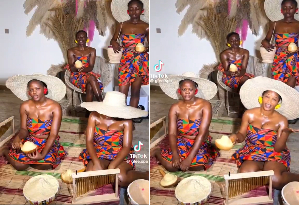Paramount Chief (Omanhene) of New Juaben Traditional Area and former Government Statistician, Daasebre Prof. Emeritus Oti Boateng has launched the healthcare and sanitation project "Operation Clean Communities" to mark his 83rd birthday.
Known as "Operation Clean Communities", the hygienic intervention is expected to prevent the spread of not only COVID-19 but also four major diseases such as malaria, cholera, typhoid, and measles revealed as afflicting the communities in the Root-based survey conducted in 2020.
Speaking at the launch of "Operation Clean Communities" at New Juaben Omanhene's Palace in Koforidua powered by Zoomlion Ghana Ltd, IRC International Water, and Sanitation Center in Ghana, Daasebre Prof. Emeritus Oti Boateng said.
"I am extremely elated for the rare opportunity to host such a momentous event on such historic occasion with a dual significance. Today coincides with the first anniversary of the declaration of COVID-19 as a pandemic by World Health Organization.
It also coincides with my 83rd birthday. The launch of “Operation Clean Communities” today may, therefore, be considered as my humble birthday present to the Chiefs and people of New Juaben in particular and Ghanaians in general.
Operation Clean Communities is derived from health, which is one of the six thematic development concerns of the Root-based model. Through the built-in communication and information flow mechanism, the communities are connected together with shared ideas and expertise for rapid development.
By such dynamic institutional networking, these communities are forged in strength and connected in unity to promote sustainable community and national development. Guided by the cardinal principles of diversity and inclusion, the Root-based communities continue to thrive by staying connected.
As a root-based development initiative, Operation Clean Communities is expected to help community members maintain and improve sanitation and wellbeing, prevent the spread of infectious diseases and upgrade their preparedness for natural disasters. The community we live in is part of who we are. The decisions you and your neighbors make impact those around you since the community embraces all its residents who wouldn’t have it any other way!
Operation Clean Communities requires residents to look beyond themselves and take “collective responsibility”. It focuses on sanitation and the importance of leading a generally healthy lifestyle in order to protect the community as a whole. The collective responsibilities that individuals have for their communal health can lead to positive interactions within the community as a whole.
Thus, Operation Clean Communities is inextricably tied to individual wellness as the community constitutes the environment in which people live. It is therefore difficult to be healthy personally if your community is not clean and healthy.
The operation focuses on the preventive rather than the curative aspect of healthcare. It is inspired by the universal dictum that prevention is better than cure. It will thus involve the use of trained personnel in comprehensive health education of households within the two Municipalities constituting the New Juaben Traditional Area.
This critical phase will be preceded and followed by pre-intervention and post-intervention surveys to establish the level of community knowledge on sanitation and disease transmission mechanisms.
This will also permit the use of statistical techniques to measure the impact of the health education intervention. By this strategy, the operation is expected to break the pathway of disease transmission not only for COVID-19 but also for the four major diseases of malaria, cholera, typhoid and measles revealed as afflicting the communities in the Root-based survey conducted in 2020.
"Mr. Chairman, by the power and authority vested in me as Omanhene of New Juaben Traditional Area, I declare the 'Operation Clean Communities' duly launched".
"Mr. Chairman, in July 2019 the New Juaben Traditional Council decided to implement the award-winning Root-based Model (RBM), developed by its President, for sustainable community development in Ghana, Africa, and the world.
"This dynamic institutional architecture, which connects all the 12 communities and their coordinating Board in New Juaben, was inaugurated in November 2019 to form the foundational basis of the Citizens Sector created under the model.
"In February 2020, the first baseline survey of the model was conducted encompassing six basic development concerns of demographic information, benefits emanating from community engagement with stakeholders, economy and infrastructure, education, health, and agriculture".
The survey made available authentic data to assess the basic needs of the communities and the best policy intervention measures for them. It also provided an informed basis for effective planning and implementation of the Root-based sustainable development initiatives.
I am happy to announce that, by dint of hard work and determination, the Omanhene completed the survey report and developed it into a fully-fledged reference book titled “Implementing The Root-based Development” within the shortest period of six months (March to August 2020).
The book, which is now available on Amazon, will soon be available locally.
In addition to international reviews including Associated Press, Kirkus Indie, and BlueInk raving about the groundbreaking Root-based model, the government of Ghana and several dignitaries have also expressed their support for the model.
The President of Ghana, Nana Addo Dankwa Akufo-Addo, pledged his full support to the root-based development initiative during his courtesy call on Daasebre on 13th October 2019. In a keynote address to launch the Root-based development implementation on 20th November 2019, the Vice-President of Ghana stressed that “the Root-based model is what African governments need to complement their efforts in the areas of social and economic development”.
He further noted that “the introduction of the ‘Citizens Sector’ as the principal anchor of the Root-based Community Development model is the viable route to mobilizing and harmonizing our collective strengths for local development”.
During a courtesy call on the Omanhene by the Indian High Commissioner to Ghana on 31st January 2021, it was recognized that the award-winning Root-based development model holds the real key to the economic liberation of the developing world. It was also agreed to establish partnerships between the Root-based institutions and similar entities in India to promote indigenous herbal development which is known to have a dual positive impact on the national economy and health.
Otumfuo Osei Tutu II, Asantehene, has also expressed his full support for the award-winning Root-based Model for Sustainable Community Development during a courtesy call on him at the Manhyia Palace by Daasebre Oti Boateng, Omanhene of New Juaben, on 25th February 2021.
Otumfuo noted that “given the overwhelming contemporary development challenges, government alone cannot effectively respond to them but needs community assistance across the nation to do so”.
There are many other Traditional Leaders in the country who have also expressed unflinching support for Root-based sustainable community development.
Mr. Chairman, the New Juaben Traditional Council, committed to keeping its communities clean and free from diseases, decided on 5th February 2021 to embark on “Operation Clean Communities” to complement the government’s effort to reduce the spread of COVID-19 and other communicable diseases in the Traditional Area.
The initiative forms part of the Council’s community development efforts within the implementation strategy of the existing award-winning Root-based development model (RBM) developed by Daasebre Oti Boateng for Ghana, Africa, and the world.
Regional News of Friday, 12 March 2021
Source: Bright Kwame Boatri, Contributor













